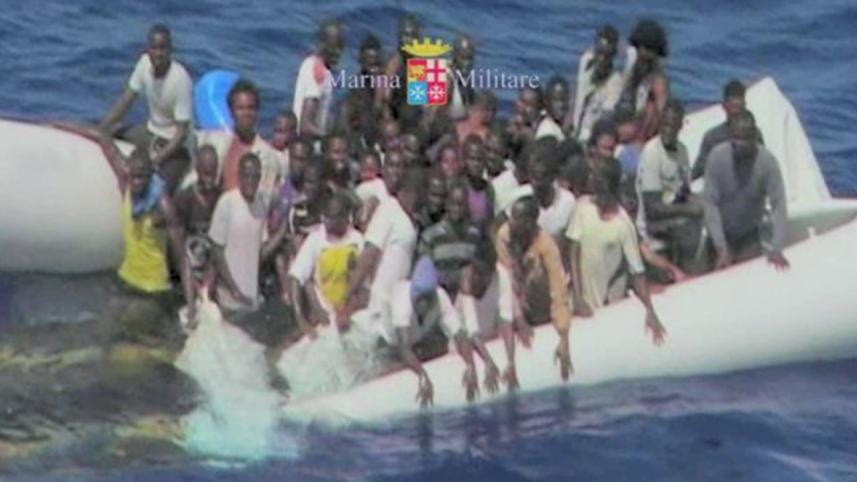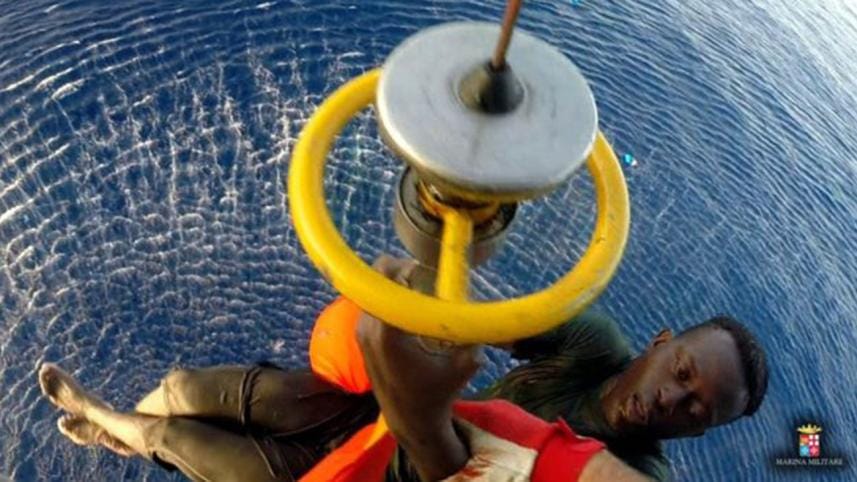Italy navy rescues 50 migrants from dinghy

Italy's navy says it has rescued 52 migrants from a sinking rubber dinghy in the Mediterranean, but about 50 others are missing.
A warship was able to pick up about half of those on board. Another two people were rescued after being spotted clinging to a floating barrel.
Meanwhile, migrants continue to arrive on the Greek island of Kos, where tensions are growing over the influx.
The European Commission has called the situation "beyond urgent".
A spokeswoman said that a "collective European response" was required to deal with the hundreds of thousands of people trying to reach European shores.
The UN High Commissioner for Refugees says about 250,000 migrants have crossed by sea to Europe so far this year - 124,000 to Greece and 98,000 to Italy.
The Italian navy said it had co-ordinated the rescue of 1,700 people on Tuesday alone. The latest rescue was captured on camera came after an Italian naval helicopter spotted about people clinging to a rubber dinghy that was sinking.
Life rafts from a warship were quickly despatched and were able to rescue about 50 people - including two people who had become separated from the boat and were clinging to a barrel.
The survivors, who have since been taken to the Italian island of Lampedusa, said there were originally at least 100 people on board the boat.
'Out of control'
Meanwhile the medical charity MSF has said it is "very worried" by the situation in the Aegean island of Kos, where tensions are high between the authorities and the migrants and refugees.

The island, a popular tourist destination, has struggled to cope with 7,000 migrants who arrived on its beaches in July and have been camping alongside roads and beaches in wretched conditions.
Chaos broke out on Tuesday when police used force to try to restore order during the relocation of migrants to a football stadium for registration.
Kos mayor Giorgos Kiritsis has warned: "The situation.... is out of control. There is a real danger that blood will be shed."
MSF accused the authorities of failing to provide basic services such as water, food and shelter for fear of creating a "pull factor".
"The truth is that people fleeing war will keep on coming whether or not the authorities are trying to stop them from doing so," said Brice de le Vingne, MSF Director of Operations, pointing out that the majority of arrivals were fleeing war in Syria and Afghanistan.
Greece's Prime Minister Alexis Tsipras has said his country's economic problems mean it is facing a humanitarian "crisis within a crisis" and cannot cope with the influx.
European Commission spokeswoman Natasha Bertaud said the EU was in touch with Greece "to see what they need and how we can provide the best help for them at this time".
"Hot-spot teams will be deployed to process large number of asylum applications - and should Greece request more emergency funding, we stand ready to assist," Bertaud said.



 For all latest news, follow The Daily Star's Google News channel.
For all latest news, follow The Daily Star's Google News channel.
Comments